ATV Riders Forum > General ATV Discussion > Open Forum > How much do pro atv racers make?
PDA
View Full Version : How much do pro atv racers make?
esr250r86
04-17-2007, 11:47 PM
I am just wondering how an atv racer makes a living. Lets say Doug gust. Is he sponsored by factory suzuki and does he pay anything for his bike or do they provide it for him? Does he get to keep the money he wins from a race or does it go to his team? Does he get payed yearly? I am just curious as to how they make their living. thanks.
CannondaleRider
04-17-2007, 11:54 PM
At the FULL on Factory level, everything is provided.
Free bikes, free parts, free gear, free entry, etc. etc.
Not only free everything basically, but the riders usually make a decent chunk of change.
Obviously they would not disclose how much, rightfully so.
Mc. Muffin
04-18-2007, 12:12 AM
somewhere around 100k
CannondaleRider
04-18-2007, 12:30 AM
You can't give that answer.
The amount of money made by top-level Pro atv racers has such drastic highs and lows.
I heard at one time, a certain high-level national pro, with a full on factory ride was given 6,000,000 a year. Not only his income, but to pay all the mechanics, truck drivers, etc etc. Among the racing costs for that year.
Also, we need to be more specific on the term "Pro" I could call up Pepper at WORCS and turn Pro right now, but would not be making a dime. I'm teammates with the #3, #7, and #11 National WORCS Pro Riders......None of them make a living in racing, because they are mainly privateers. Hell, Doug Eichner has been a Welder at Fox Shocks for a long time........Just some examples, the term "Pro" is way to broad.
54warrior
04-18-2007, 06:45 AM
I think the majority of them have their own jobs. ATV pro's aren't even close to being at the level of the bike guys.
ATV pro's aren't even close to being at the level of the bike guys.
That may have changed within the past couple years, but only for a select few. It is well known that "Digger" Doug Gust has had his own excavating business for years, and Bill Ballance owns a farm somewhere in Kentucky. I'm sure alot of the other guys have their regular jobs still too. They might be making some money, but I doubt it's enough to justify quitting their job.
54warrior
04-18-2007, 06:46 AM
Originally posted by CannondaleRider
I heard at one time, a certain high-level national pro, with a full on factory ride was given 6,000,000 a year. Not only his income, but to pay all the mechanics, truck drivers, etc etc. Among the racing costs for that year.
That seems a bit outrageous to me?!?! I'd tend to agree with the 100k figure that someone else posted.
bradley300
04-18-2007, 07:12 AM
i think the 6,000,000 million figure is more what it cost for suzuki to feild a team of full factory riders.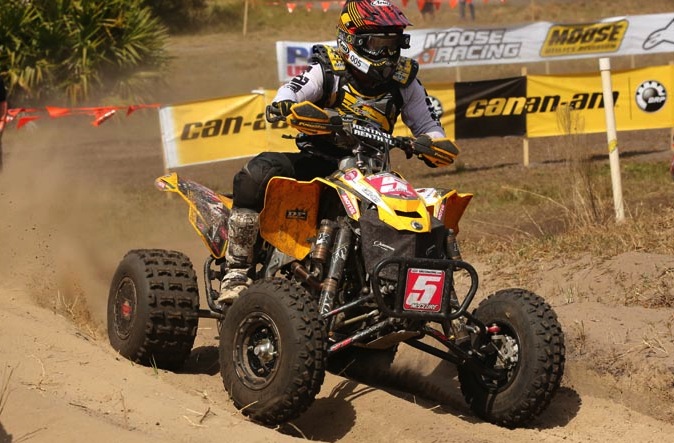 i think its probably a little high, but probably not as much as you would think.
i think its probably a little high, but probably not as much as you would think.
pretty sure it was in dirt wheels that bill ballance makes around 80,000 from yamaha plus winning/championship bonuses. along with his other sponsors. from what i heard the going price to get your a-arms on bills quad for the season is 30,000 + his parts
54warrior
04-18-2007, 07:18 AM
Originally posted by bradley300
i think the 6,000,000 million figure is more what it cost for suzuki to feild a team of full factory riders. i think its probably a little high, but probably not as much as you would think.
pretty sure it was in dirt wheels that bill ballance makes around 80,000 from yamaha plus winning/championship bonuses. along with his other sponsors. from what i heard the going price to get your a-arms on bills quad for the season is 30,000 + his parts
That statement makes sense. 80k sounds more reasonable.
smr
04-18-2007, 07:36 AM
Different pros make different amounts.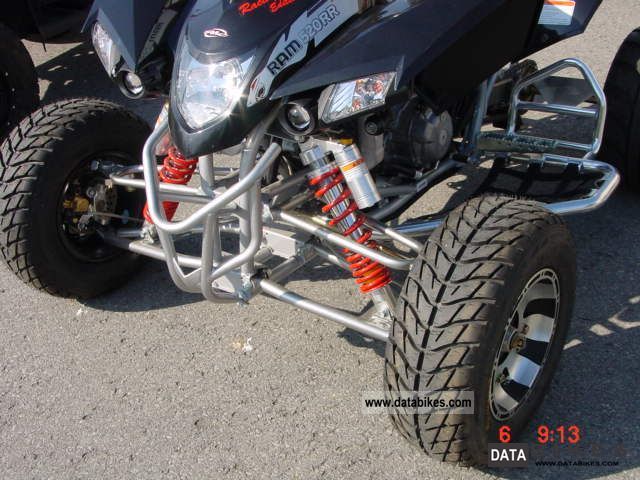
Pro's don't make as much as people think they do, like someone said most work normal jobs and I can't think of any that don't have another income besides racing.
Bill and BJ own a store in Oakland Ky and they also make money selling ATV parts. They also do some farming.
Bradley300..I would say you are correct on that amount.
400exrider707
04-18-2007, 09:02 AM
Dont forget that bill is the #1 rider in GNCC for how many years and he makes $80k. I believe in the great outdoors dirt bike movies, they mention about what they make. The 10th place finisher for the year... now this is only 10th place not last of like 40 guys... made something like $23K that year....
54warrior
04-18-2007, 09:16 AM
Originally posted by 400exrider707
Dont forget that bill is the #1 rider in GNCC for how many years and he makes $80k. I believe in the great outdoors dirt bike movies, they mention about what they make. The 10th place finisher for the year... now this is only 10th place not last of like 40 guys... made something like $23K that year....
The 10th place finisher for the year... now this is only 10th place not last of like 40 guys... made something like $23K that year....
Exactly, when you factor in the equipment costs, travel, parts, etc... That guy was lucky to break even.
Moral of the story: Don't think your gonna be a gazillionaire by becoming a Pro Quad rider. Only if your the cream of the crop will you be able to quit your day job, and even then you'll still be making less than 6 figures. Who knows what kind of product/sponsorship endorsements might pay though???
trick250r
04-18-2007, 09:44 AM
Originally posted by 54warrior
Exactly, when you factor in the equipment costs, travel, parts, etc... That guy was lucky to break even.
Moral of the story: Don't think your gonna be a gazillionaire by becoming a Pro Quad rider. Only if your the cream of the crop will you be able to quit your day job, and even then you'll still be making less than 6 figures.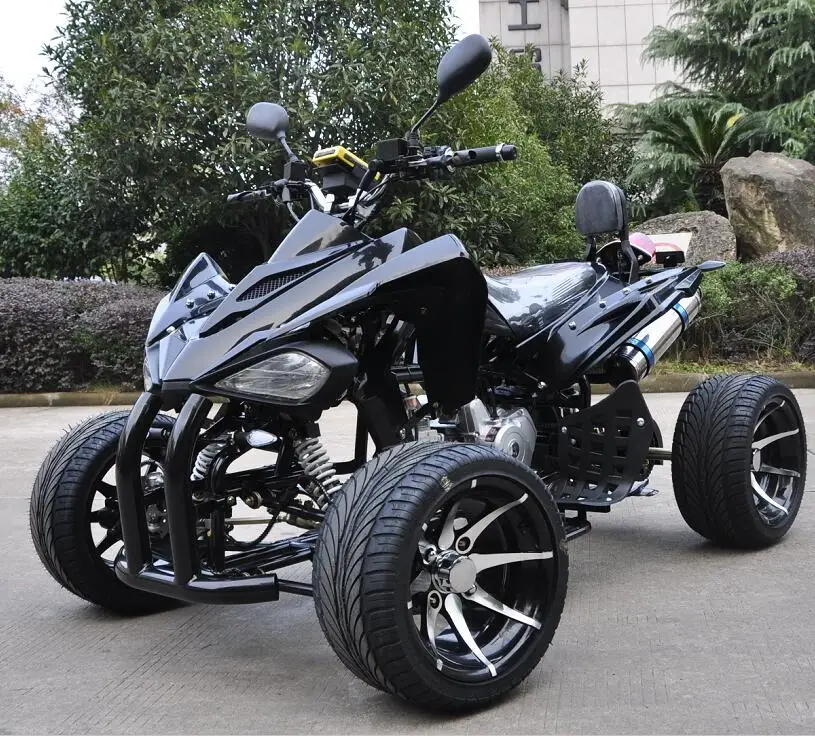 Who knows what kind of product/sponsorship endorsements might pay though???
Who knows what kind of product/sponsorship endorsements might pay though???
personally, i think that if anyone is in it for the money or the fame, they need to get out. money and fame arent what riding/racing are about.
troyleepred719
04-18-2007, 01:01 PM
dont forget, they get an amount of money everytime they put there name on a product, and then get a cut for how many they sell.,..... its not much, but think of it, they make 100k to race and do soemthing they love, they dont have to pay for anything on the road, and get "free" toys, so there set, theres money to be made in the race world, you just have to know where to find it, not to mention the expertise they will have on and around there machines, for when they retire, like soemone said about eichner welding at works.....something he knows how to do because of his career.....
smr
04-18-2007, 01:33 PM
Originally posted by troyleepred719
dont forget, they get an amount of money everytime they put there name on a product, and then get a cut for how many they sell. ,..... its not much, but think of it, they make 100k to race and do soemthing they love, they dont have to pay for anything on the road, and get "free" toys, so there set, theres money to be made in the race world, you just have to know where to find it, not to mention the expertise they will have on and around there machines, for when they retire, like soemone said about eichner welding at works.....something he knows how to do because of his career.....
,..... its not much, but think of it, they make 100k to race and do soemthing they love, they dont have to pay for anything on the road, and get "free" toys, so there set, theres money to be made in the race world, you just have to know where to find it, not to mention the expertise they will have on and around there machines, for when they retire, like soemone said about eichner welding at works.....something he knows how to do because of his career.....
I think your missing the point. Most of them have to pay for their own travel. I know Jerimiah Jones had to pay for his travel to all the races but a few. If you think 100k is their take home pay then your badly misstaken.
also..Eichner's career is welding and that supports his racing.
Yes they do get money everytime they put thier name on something but they also spend hours upon hours doing test for these companies.
troyleepred719
04-18-2007, 02:01 PM
Originally posted by smr
I think your missing the point. Most of them have to pay for their own travel. I know Jerimiah Jones had to pay for his travel to all the races but a few. If you think 100k is their take home pay then your badly misstaken.
Most of them have to pay for their own travel. I know Jerimiah Jones had to pay for his travel to all the races but a few. If you think 100k is their take home pay then your badly misstaken.
also..Eichner's career is welding and that supports his racing.
Yes they do get money everytime they put thier name on something but they also spend hours upon hours doing test for these companies.
i know it supports his racing, what im saying is that when he retires, he will have learned a new trade, and soemthing he can use to continue bei.ng around racing, whille making money, and although they put alot of hours into testing for companies, they are still making money. i find it hard to believe that they only make less than 100k a year, Have you ever seen their houses?
54warrior
04-18-2007, 02:17 PM
Now I certainly don't know the facts, but I would be willing to speculate that Doug Eichner probably knew how to weld and got his job long before he became a top name in the ATV biz.
smr
04-18-2007, 02:40 PM
Originally posted by troyleepred719
i know it supports his racing, what im saying is that when he retires, he will have learned a new trade, and soemthing he can use to continue bei.ng around racing, whille making money, and although they put alot of hours into testing for companies, they are still making money. i find it hard to believe that they only make less than 100k a year, Have you ever seen their houses?
I have seen some, most of them had good jobs before they turned pro. They didn't get that money racing quads.
This has been talked about many times on this forum and the money you think these guys are making just ain't there.
54warrior
04-18-2007, 02:44 PM
I think the only pro racers that can actually make a living off of it are the following:
Nascar/Busch
Indycar type series'
AMA Motocross/Supercross
WoO Sprint Car top 5 or 6 drivers
WoO Late Model top 5 or 6
Rally Car
NHRA
The majority of these guys driving cars got to where they are because they had money already.
honda4life72
04-18-2007, 03:47 PM
william yokley's house is very small...i'd say his shop is bigger then his house is and it isn't big either...theres a video somewhere i will try to find it
quad2xtreme
04-18-2007, 05:13 PM
Originally posted by 54warrior
I think the only pro racers that can actually make a living off of it are the following:
Nascar/Busch
Indycar type series'
AMA Motocross/Supercross
WoO Sprint Car top 5 or 6 drivers
WoO Late Model top 5 or 6
Rally Car
NHRA
The majority of these guys driving cars got to where they are because they had money already.
and many of the owners of these cars don't make a dime...write it off to advertising or are independently wealthy and it is a hobby to them...same in the horse racing business.
SRH
04-18-2007, 05:25 PM
id say b allance and gust are the highest, prob $350k a year high dollar, low dollar 200k
id say out of all 20 the gnc guys look like this
80k 65k 110k 20k 50k 50 k right around there, rest of the guys are paying for there stuff, the future looks healthy
when u think about what rc, reed, stewart , windham are making thats just chump change, bike riders were making what quad guys are now almost 20 years ago and when you consider the top 20 in bikes make a healthy living 25 k isnt bad when your hobby is paid and your doing what you love
mephyst
04-18-2007, 05:38 PM
Not even in Supercross do they make any great money unless you are the top factory riders.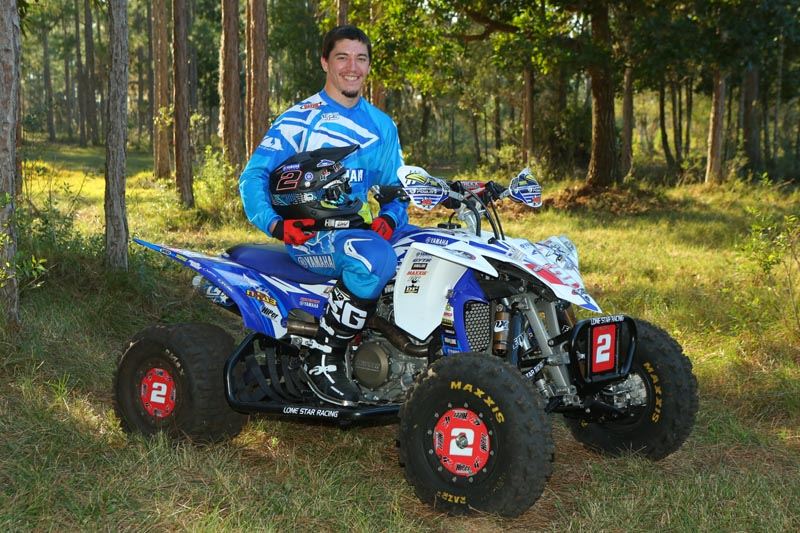 And even then, winning the title for the season is only 1million I believe. That's pennies considered to other types of racing. But there are far more people on bikes and people who watch bikes, so sponsors pay much more.
And even then, winning the title for the season is only 1million I believe. That's pennies considered to other types of racing. But there are far more people on bikes and people who watch bikes, so sponsors pay much more.
Dan_Guetter
04-18-2007, 05:39 PM
Mx pros make most of there there money off endorsements...quads are now starting to go down that path.
my88r
04-18-2007, 05:41 PM
Originally posted by SRH
id say b allance and gust are the highest, prob $350k a year high dollar, low dollar 200k
id say out of all 20 the gnc guys look like this
80k 65k 110k 20k 50k 50 k right around there, rest of the guys are paying for there stuff, the future looks healthy
when u think about what rc, reed, stewart , windham are making thats just chump change, bike riders were making what quad guys are now almost 20 years ago and when you consider the top 20 in bikes make a healthy living 25 k isnt bad when your hobby is paid and your doing what you love
id dout ballance and gust make that much
SRH
04-18-2007, 05:45 PM
Originally posted by my88r
id dout ballance and gust make that much
so you dont think its a good possibility, there contracts with the factory, winnings, endorsements and what not add up to that much?
my88r
04-18-2007, 05:46 PM
cloes but not 350 though but your in the right area;)
BlasterEaten250
04-18-2007, 06:30 PM
I could be completely wrong, but I think I remember a magazine saying Tim Farr made 2 million to race for Honda when he was first picked up by them racing a 450. Could be wrong though, I really have no clue how much they make.
Could be wrong though, I really have no clue how much they make.
STEVENJANNA
04-18-2007, 06:32 PM
I can tell you this, last season Suzuki was giving a $50k bonus for a championship and Yamaha was offering $25k. If memory serves Suzuki was paying $10k for a win and Yamaha was paying $5k. These numbers are on top of salary and endorsements. I believe that Gust sold his excavation company, Spader was able to hire full time personel to run his physical therapy practice, Natalie was able to leave his family scrap business. I don't know what the total dollar amount is, but I do know that these guys are able to "quit" there jobs and make a living at what there passionate about. It was stated before and just like the rest of us, up until recently atv racing has been a hobby for everybody. The careers of all these guys came 1st because that's what payed the bills.
smr
04-18-2007, 08:24 PM
guys I know it sounds great but I know a couple of the pros and they don't make that much. If they did then Bill Ballance wouldn't be wasting his time selling parts out of his shop. It's alot of hard work and they enjoy what they do, but they don't make anywhere near what to SX bike riders or any nascar drivers make.
If they did then Bill Ballance wouldn't be wasting his time selling parts out of his shop. It's alot of hard work and they enjoy what they do, but they don't make anywhere near what to SX bike riders or any nascar drivers make.
Like I said, most of them have good jobs or come from family businesses. They have other imcomes besides racing.
This would be a good question to ask guys like Brad Paige or Jeff Stoess. Both have had success in racing but wasn't able to suport themselves with racing alone.
honduh540
04-18-2007, 08:33 PM
i know that natalie got a nice offer from a specific a-arm company to run their stuff and it was plenty to make a year for the rest of anyones life..... and he turned it down .... sorry not going to say any numbers or names
Powered by vBulletin® Version 4.2.1 Copyright © 2022 vBulletin Solutions, Inc. All rights reserved.
By Mary Dowd Updated January 25, 2021
Fervent fans idolize top racers and marvel at their daredevil feats, which does not go unnoticed by sponsors. Companies like Honda, Suzuki, Fiat and Yamaha pay big money to promote their brand and attract top talent to sponsored racing teams. Nonetheless, only a few professional motorcycle racers rank among the world’s highest-paid athletes despite the dangers of the sport and risk of dying.
Companies like Honda, Suzuki, Fiat and Yamaha pay big money to promote their brand and attract top talent to sponsored racing teams. Nonetheless, only a few professional motorcycle racers rank among the world’s highest-paid athletes despite the dangers of the sport and risk of dying.
Up-and-coming racers make far less than established professionals, who can earn millions of dollars. Salaries and earning income potential varies widely according to a racer’s natural skill, type of bike used to race and the number of races entered. Many professional racers sign salary contracts with nondisclosure clauses, making salary comparisons difficult.
Professional motorcycle riders compete individually or as members of a manufacturer’s sponsored team to win championships and a “purse” of money that varies in size from one event to the next. The purse is split between participants with the winner receiving the biggest cut of the prize. For example, the first-place winner of the 2020 Anaheim One Supercross won $12,000, and the rider in 22nd place received $2,000. A racer needs to consistently place at or near the top to make enough money to race as a career rather than as a hobby.
For example, the first-place winner of the 2020 Anaheim One Supercross won $12,000, and the rider in 22nd place received $2,000. A racer needs to consistently place at or near the top to make enough money to race as a career rather than as a hobby.
Races are held throughout the year to qualify riders to compete at the championship level. The Motorcycle Grand Prix, or MotoGP, is the oldest world championship with the highest-paid athletes, according to the Clinton Courier. Competitors ride road-racing machines built specifically for the purpose of racing.
For off-roading motocross enthusiasts, the top race to strive for is the Motocross World Championship, geared toward two- and four-stroke engines. Based on insider information in Motocross Action Magazine, the highest-paid motocross riders in 2020 with company sponsors could expect to gross somewhere between $20,000 and $100,000 per month. Thousands of fans also flock to the Daytona 200, Isle of Man TT and the Superbike World Championship.
Sportekz identified Marc Marquez as the top-earning MotoGP professional motorcycle rider of 2020, earning an annual salary of $14.5 million on the Respol Honda Team. In 2013, 20-year-old Marquez became the youngest racer to win the MotoGP World Championship.
The second highest-paid rider of 2020 was Valentino Rossi, who made a base salary of $12.5 million. As a seven-time world champion, he has amassed an estimated net worth of $180 million. In third place was Maverick Vinales, who signed a MotoGP contract after a strong finish in the 2014 Moto2 season.
Not everyone who signs a contract with MotoGP gets paid millions of dollars. For example, Mike Kallio and Brad Binder signed replacement rider contracts and only earned money if they raced. Replacement and wildcard riders stood to earn $10,000 in MotoGP prize money.
Hotshot motorcycle racers achieve celebrity status and find themselves hounded for autographs and followed by paparazzi. Their racing contracts require them to regularly attend media events and pose for pictures with fans. All that publicity leads to endorsement offers from companies and manufacturers eager to pay top dollar to feature popular racers in advertising. Valentino Rossi, for example, has earned an estimated $10 million from endorsing products like energy drinks, tires and sunglasses, Sportekz reports.
Professional motorcycle racers sponsored by a company must be careful not to endorse a competitor’s product. For example, if they work for Honda, they can’t promote motorcycles, ATVs or watercraft made by Yamaha, or they could be fined by their sponsor.
Launching a career as a motorcycle racer requires raw talent, grit, determination and money to buy equipment. Those just starting out may need another job to support themselves while they hone their racing skills. Competition is fierce, and most motorcycle racers do not become superstars.
Those just starting out may need another job to support themselves while they hone their racing skills. Competition is fierce, and most motorcycle racers do not become superstars.
According to SalaryExpert, U.S. motorcycle racer salary averages $50,441 per year, not including an average bonus of $1,276. Entry-level racers with three years of experience or less earn an average annual salary of $37,203, which increases to $61,475 after eight years of successful racing experience.
In many ways, it is the financial nuance that becomes one of the most powerful motivations for amateur athletes who want to end up in the elite caste of professionals. But do not rush to put on a helmet and rush to the track - the income of even venerable athletes sometimes depends on many factors. Do not be a racer at the right time in the right place, and the lion's share of the planned income will slip away from him like sand through his fingers. So what determines the total amount of income, and how to bring it to the maximum value?
So what determines the total amount of income, and how to bring it to the maximum value?
The main factors influencing the amount of income in motocross
First and foremost, the total fee depends on the status of the rider, namely, whether he is a professional or an amateur. Professional athletes draw financial resources "for bread and butter" simultaneously from different sources. One of the most generous are the motorcycle manufacturing companies on which riders compete. It is quite logical that the athlete who won the first place receives a much larger cash bonus from the manufacturer than the one who came second or third. Like it or not, winning the competition is the best advertisement for the company's products! Naturally, the most “juicy” monetary reward, often reaching $1,000,000, goes to the winner of the whole championship. In addition, money drips to professionals from sponsors, advertising partners and other sources, which allows top athletes to earn several million dollars a year.
Far less bright prospects open up for riders, for whom motocross is not their main profession, but something like a hobby, albeit a very serious one. As a rule, such athletes work in parallel at other jobs, because they can only rely on sponsorship fees and prize payments. Which is often not enough to cover all expenses, which forces such enthusiasts to invest their own funds.
Yes, an amateur rider can get $10,000-12,000 for winning a race, but his chances of winning the championship are slim, whatever one may say, and it is extremely difficult to compete with powerful factory teams. Thus, even the best amateur private traders earn no more than $100-200 thousand per season, which is barely enough to keep this not cheap hobby afloat.
Prize funds
It is known that the regulations of each competition provide for a prize fund, the size of which depends on the status, scale and popularity of the event. The prize fund is divided into specific amounts, the size of which is the greater, the higher the place occupied by their recipients in the overall standings.
Statistically, US motocross riders who compete in Supercross have the highest earnings. Even the “middle-level” racers who have reached the finals easily recoup the financial investments and efforts expended to achieve the result. Further in our analysis, we will focus on the earnings of American athletes participating in the AMA Supercross Championshire.
In the 250SX and 450SX classes, the prize fund for each stage is set at $114,830 in both cases. The exception is the final round in Las Vegas, where the winners share $121,080. Let's consider the nuances in more detail.
Let's take the 450SX class as an example: victory in the final will bring the rider 12,000 dollars, the silver medalist will receive 6,000, the bronze medalist - $ 4,250. Even for the last place, subject to the participation of 22 athletes, 1415 US dollars are awarded. In other words, in order to make more or less significant money, you need to be in the top three, which is quite natural.
If an athlete finishes tenth in almost every race, his annual income in prize money and bonuses could be $52,700. The most successful athletes, who constantly occupy places on the podium, earn over $ 200,000 a year without any problems, and this is not counting the “winning” bonuses from sponsors and the team that they are entitled to under the contract. Well, the very best ones often receive more than a million in a season alone.
The most successful athletes, who constantly occupy places on the podium, earn over $ 200,000 a year without any problems, and this is not counting the “winning” bonuses from sponsors and the team that they are entitled to under the contract. Well, the very best ones often receive more than a million in a season alone.
The best include, for example, Ryan Dungey, who won the AMA Supercross Championshire in 2016 and earned a total of just over $2,000,000. Let's take a look at what this impressive amount consists of.
1. Team bonuses:
2. Feld Entertainment promotional bonuses:
Total: $2,158,500 90,003 90,002 In a similar fashion, a Series 5 finisher earns over $51,000 plus approximately $16,000 in Feld Entertainment bonuses.
Looking at these statistics, you certainly want to buy a motorcycle and do motocross. One thing is for sure, this is one of the most difficult and dangerous sports. Correctly assess your strengths.
Payments from manufacturers
Racers who drive for a particular team work under a contract, receiving a salary every month. Its terms also provide for bonuses for winning championships and their individual stages, as well as compensation for travel expenses. As a general rule, sponsored athletes will have at least a pair of identical bikes available for training and competition.
Advertising
It has long been known that advertising contracts with celebrities from all walks of life provide them with the lion's share of their income. Top motocross racers are no exception - they also actively advertise products from different manufacturers, usually near-sport. In this case, there are no standard figures - all amounts are negotiated individually between the athlete's agent and the advertiser. Perhaps the only restriction in the promotional activities of the rider is a logical ban on advertising products of competitors, and such boundaries are usually clearly spelled out in his contract with the team. For violation of these rules, a considerable fine, or even dismissal, may well “arrive”.
Perhaps the only restriction in the promotional activities of the rider is a logical ban on advertising products of competitors, and such boundaries are usually clearly spelled out in his contract with the team. For violation of these rules, a considerable fine, or even dismissal, may well “arrive”.
When it comes to factory team riders, they are usually required by contract to dedicate a certain number of days per year to promotional activities. This includes participation in corporate parties, shooting commercials, signing autographs, and so on.
A very important, and sometimes the only (if we talk about amateur athletes) source of income is private sponsorship. The funds received under it usually go towards the purchase of racing equipment, spare parts, and even the motorcycle itself, as well as the payment of related expenses. For the placement of a logo on a motorcycle participating in races, they can pay both in money and in products or discounts on it.
Large corporations such as Yamaha, Kawasaki, KTM, Honda and others involved in the production of off-road and other motorcycle equipment often sponsor not only large teams, but also private athletes. Tire manufacturers - Maxxis, Dunlop, Michelin and others - often allow private riders to become part of their team without signing a contract, which is mandatory for most factory team members. The conditions and amount of remuneration directly depend on the talent and skill of the athlete - it can be either a cash payment or a free motorcycle or protective equipment.
Tire manufacturers - Maxxis, Dunlop, Michelin and others - often allow private riders to become part of their team without signing a contract, which is mandatory for most factory team members. The conditions and amount of remuneration directly depend on the talent and skill of the athlete - it can be either a cash payment or a free motorcycle or protective equipment.
Categories of prize payments depending on the type of motorcycle
Prize payments depend not only on the place taken and the prestige of the competition, but also on the volume of the motorcycle engine and even its brand. Let's say an unsponsored racer who rides a Kawasaki KX450 and takes first place on it can make $50,000 rich. But his colleague, who won the race in a car with an engine capacity of 250cc, will have to be content with a prize amount of only $ 28,000.
Every major motorcycle manufacturer has a budget for sponsorship and promotional items. The more advertising of his products he plans to buy, the higher the payment for the first place in the competition.
As part of a private agreement, riders participating in competitions on behalf of certain manufacturers can receive up to $100,000 for this.
Analysis of the earnings of factory team members
Membership in the factory team of a venerable motorcycle manufacturer is the pink dream of any rider. The best members of such teams easily receive $6-10 million, not counting bonuses and prize payments from corporations. But, of course, such amounts only shine for the best of the best - the incomes of most athletes are much more modest.
The earnings of factory team members are largely dependent on the official salary stipulated in the contract. It usually consists of a "base salary", which is 12 equal payments in the amount of $20,000 per month, as well as bonuses and additional amounts agreed between the plant and the athlete individually. In other words, for one successful season, a good member of the factory team may well earn a couple of million dollars.
Monthly salary
A successful team athlete's monthly salary can start at $20,000 and go up to $100,000. Of course, for an average person, even from a very developed country, these are very substantial amounts, but in the world of sports they are not so great. Especially when compared with MotoGP, automotive or many team sports.
While team athletes don't have to purchase their own equipment to participate in competitions or training runs, part of their salary is spent on medical care, insurance and other professional needs. Well, income tax, where without it.
Sanctions for violation of contract terms
We have already mentioned that contracts with riders contain a large number of conditions, the violation of which entails different severity of punishment. For a serious violation, an athlete can be fired for five days, in addition, the manager often has such a right without any good reason. Automatic dismissal often threatens for committing a criminal offense during the term of the contract. As for fines, their size can reach $25,000 for each violation of the terms of the contract. As you remember, a fine can also be obtained for the fact that the racer a certain number of times during the year does not take part in promotional events - autograph sessions, filming commercials and the like.
As for fines, their size can reach $25,000 for each violation of the terms of the contract. As you remember, a fine can also be obtained for the fact that the racer a certain number of times during the year does not take part in promotional events - autograph sessions, filming commercials and the like.
The athlete as a private contractor
Although the direct employer team keeps the athlete and his career under full control during the validity of the contract, he still remains not an employee, but a private contractor. That is, he independently purchases medical insurance (which, due to the nature of the type of activity, costs much more than the standard one), pays for medical expenses not included in it, without receiving monetary compensation from the team. At least in the United States - as you remember, we agreed to talk about the state of affairs in this country.
However, not everything is so bad - at least the team provides the athlete with a professional mechanic, training and racing bikes, as well as other "goodies" that are not available to single riders.
Private athletes
Despite all the advantages of team play, many riders prefer to build a career in private, not being dependent on the team. This relieves them of the need to strictly comply with the terms of the contract and allows them to independently manage their time. But the earnings of such "individuals" consists only of prize money and payments according to advertising contracts.
The nature of bonuses
As mentioned earlier, athletes receive bonus payments from various sources, one of which is the manufacturer of a particular sports product. Private riders usually contract with different sponsors at the same time, advertising their companies on their motorcycles. The more famous and successful an athlete is, the more he can get under the terms of an advertising contract. For example, in the 2014 season, R. Villopoto earned over $700,000, while the prize money was only a seventh of this amount - everything else was sponsorship payments.
The highest earning of top riders
The most profitable form of motorcycle racing is MotoGP, and the record in this sport belongs to the unsurpassed Valentino Rossi, who earned $ 22 million in 2013. There is much less money in motocross, so the average annual salary is about $85,000. But "average" is a very vague concept, so let's look at specific numbers using the example of 2014.
As you can see, it is all kinds of bonuses that often make up the lion's share of the profits of professional racers.
Expenses of professional athletes
If an athlete finishes last in every race, the costs associated with participation in the competition can be overwhelming for him. They include the cost of equipment and spare parts, fuel, food, accommodation and others. On the other hand, what's the point of competing at all if there are no chances of winning? It is more logical to change the division to a less competitive one.
They include the cost of equipment and spare parts, fuel, food, accommodation and others. On the other hand, what's the point of competing at all if there are no chances of winning? It is more logical to change the division to a less competitive one.
Of course, if you are into motocross, you need to buy motorcycle equipment. As long as you do not have a sponsor, these costs are entirely your responsibility. Your health depends on it.
Bike purchase and maintenance costs
If the rider is not a member of the team - factory or private - he needs to buy motocross equipment on his own. In the US, a used two-stroke model will cost at least $1,500, a four-stroke even more. New motorcycles, of course, cost several thousand more.
After the purchase of a motorcycle, the athlete will face ongoing additional costs for maintenance, repairs, storage and logistics during the competition. Maintenance is at least the periodic replacement of oil, consumables, and so on, not to mention spare parts. Maintenance of equipment should be carried out by a professional mechanic, who also needs to be paid (in a team, this task is solved by a full-time specialist - see material Famous Mechanics Red Bull KTM Factory Racing ).
Maintenance of equipment should be carried out by a professional mechanic, who also needs to be paid (in a team, this task is solved by a full-time specialist - see material Famous Mechanics Red Bull KTM Factory Racing ).
Thus, if a rider does not win first place in most competitions, the cost of his "hobby" can easily exceed the amount of profit received.
If you are new to this sport, you should know where to buy motorcycle parts. The best place for this is the National Motor Market of Ukraine.
Race and membership fees
Professional sports are complex systems that require a lot of money to operate. The budget of any sports organization consists of both sponsorship and the annual membership fees of its members. As a rule, the amount of such fees is not very large and depends on the number of classes in which the athlete competes.
Conclusions
Summing up all of the above, we can make an unambiguous conclusion: a really talented professional athlete with an efficient agent can easily receive from several hundred thousand to a million or more dollars during the season. As a rule, the earnings of team racers are higher - in particular, due to the absence of many items of expenditure from them. On the other hand, they have noticeably less freedom of action. On the third, they have a fixed salary paid even in the off-season, while a private athlete can only earn during the racing season.
As a rule, the earnings of team racers are higher - in particular, due to the absence of many items of expenditure from them. On the other hand, they have noticeably less freedom of action. On the third, they have a fixed salary paid even in the off-season, while a private athlete can only earn during the racing season.
Therefore, think carefully and weigh the pros and cons before deciding to become a professional. Remember that motocross is not cheap, and if you don't have enough experience and skill to periodically take first place in ranking events, the costs of participating in them will always exceed income. In order to be noticed by sponsors and representatives of one of the strong teams, you need to consistently finish at least in the top seven. If that's up to you, welcome to the world of professional motocross!
November 24, 2020, 14:05
Since 2010, the independent publication Business Book GP has been conducting its own research in the field of Formula 1 economics and finance, analyzing in detail all available information. The latest issue of the publication published the salaries of Formula 1 drivers in 2020.
The latest issue of the publication published the salaries of Formula 1 drivers in 2020.
Of course, all figures are unofficial, the payment of various bonuses to riders for achieving specific results can significantly adjust income upwards. In addition, the figures do not include advertising contracts.
Lewis Hamilton has been the highest paid Formula 1 driver for many years. His salary in 2020 is estimated at 47 million euros against 42 million in 2019. In second place is Sebastian Vettel with 35 million euros, in third is Daniel Ricciardo with 20 million euros.
Compared to last year, Max Verstappen's salary increased from 12 million euros to 16 million euros. Salary Valtteri Bottas increased by 1 million euros, reaching 9 million. Ferrari's payments to Charles Leclerc are also estimated at the same amount. Salary Daniil Kvyat has not changed over the past year and is 750 thousand euros.
| Driver | Team | Salary |
L. Hamilton Hamilton | Mercedes | EUR 47 million |
| S. Vettel | Ferrari | EUR 35 million |
| D.Riccardo | 9Renault 0207EUR 20 million | |
| M. Verstappen | Red Bull | EUR 16 million |
| V.Bottas | Mercedes | EUR 9 million |
| Ch. Leclerc | Ferrari | EUR 9 million |
| K.Raikkonen | Alfa Romeo | 6 million euros |
| C. Sainz | McLaren | EUR 4.5 million |
| S. Perez | Racing Point | EUR 4 million |
E.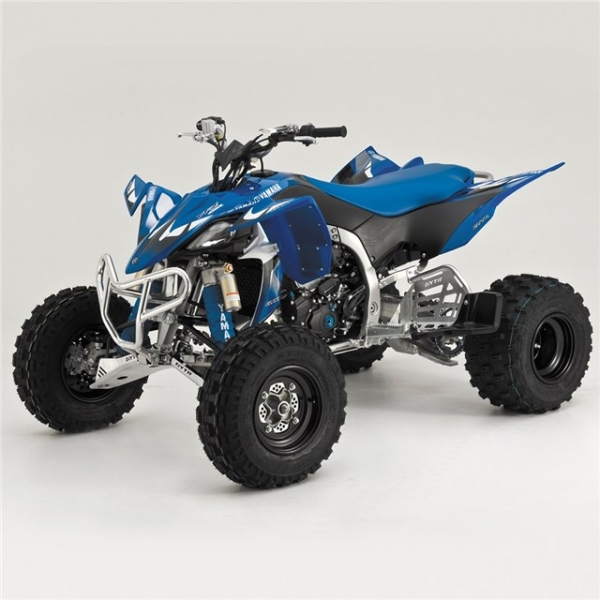 Okon Okon | Renault | EUR 4 million |
| R. Grosjean | Haas | 2 million euros |
| K. Magnussen | Haas | 2 million euros |
| A. Albon | Red Bull | 2 million euros |
| L.Norris | McLaren | EUR 1.5 million |
| L. Stroll | Racing Point | EUR 1.5 million |
| P. Gasly | AlphaTauri | EUR 1 million |
| D. Kvyat | AlphaTauri | €0.75 million |
| D.Russell | Williams | EUR 0.75 million |
N. |